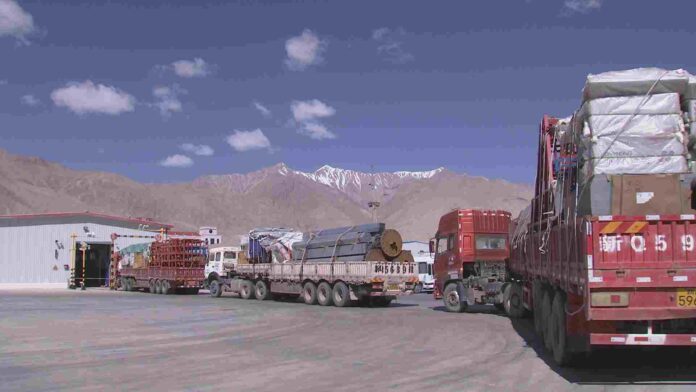KHUNJERAB: The National Logistics Cell (NLC) on Sunday successfully transported containers stranded due to the Covid-19 pandemic from Khunjerab Pass to the Silk Route Dry Port Sost in freezing temperatures ahead of schedule to avoid further losses to traders.
For this purpose, the Khunjerab border was temporarily opened from December 15 to December 25 to allow cross border movement of the containers. The border is usually closed from November 30 up until April 1 every year due to heavy snowfall in the area.
The transportation of the containers started from the Khunjerab Pass, upon opening of the border on December 15, as per the laid down Covid-19 standard operating procedures (SOPs).
The challenging task of managing the movement of the containers was made possible with the assistance of local administration and the Frontier Works Organisation (FWO). All the containers were safely moved to the NLC dry port at Sost, despite slippery conditions caused by the snow and frosted roads.
The containers were said to be carrying machinery for hydel energy projects, corona aid for the education department of Gilgit Baltistan (GB) as well as trade consignments. The goods were de-stuffed at the pass at the NLC dry port for formal customs clearance. Empty containers are to be transported back to the Khunjerab Pass for taking over by the Chinese counterpart.
Earlier on December 15, the Pak-China border crossing at Khunjerab Pass was opened for ten days.
According to an official notification, the border was opened to evacuate stranded containers from China to GB while tourists were not allowed to travel through border crossing during this period.
Only loaded and stranded containers of traders and containers carrying hydropower machinery of a power house of Hunza district entered Pakistan during the 10 days.
No container went to China from Pakistan and all Covid-19 standard operating procedures (SOPs) were strictly observed during the trade.
At 5,000 meters above sea level, the border post is the highest paved international crossing in the world, a major trade route between China and Pakistan, and an important gateway to South Asia and Europe. China mainly imports textiles, agricultural products and daily commodities through the pass, and exports plants and herbs.
The border outpost on the Karakoram Highway usually remains open for trade and travel from May till November-end every year, after which it closes for almost five months in winter.
But Pakistani containers have now been stranded in China since December 2019, when the border closed for the winter months, following which all frontiers, including Khunjerab, were indefinitely closed to contain the spread of the novel coronavirus.
In December 2019, China News Network reported that cargo import and export had reached 66,600 tonnes during 2019 at Khunjerab Pass in northwest China’s Xinjiang Uygur Autonomous Region, up 46.8 per cent from the year before. Trade volumes increased by 1.4 times, and reached values upwards of $856 million during the same period.
However, 2020 brought trade at the high border crossing to a near halt, and with winter temperatures dropping at that altitude, the movement of vehicles also became an added challenge.
























